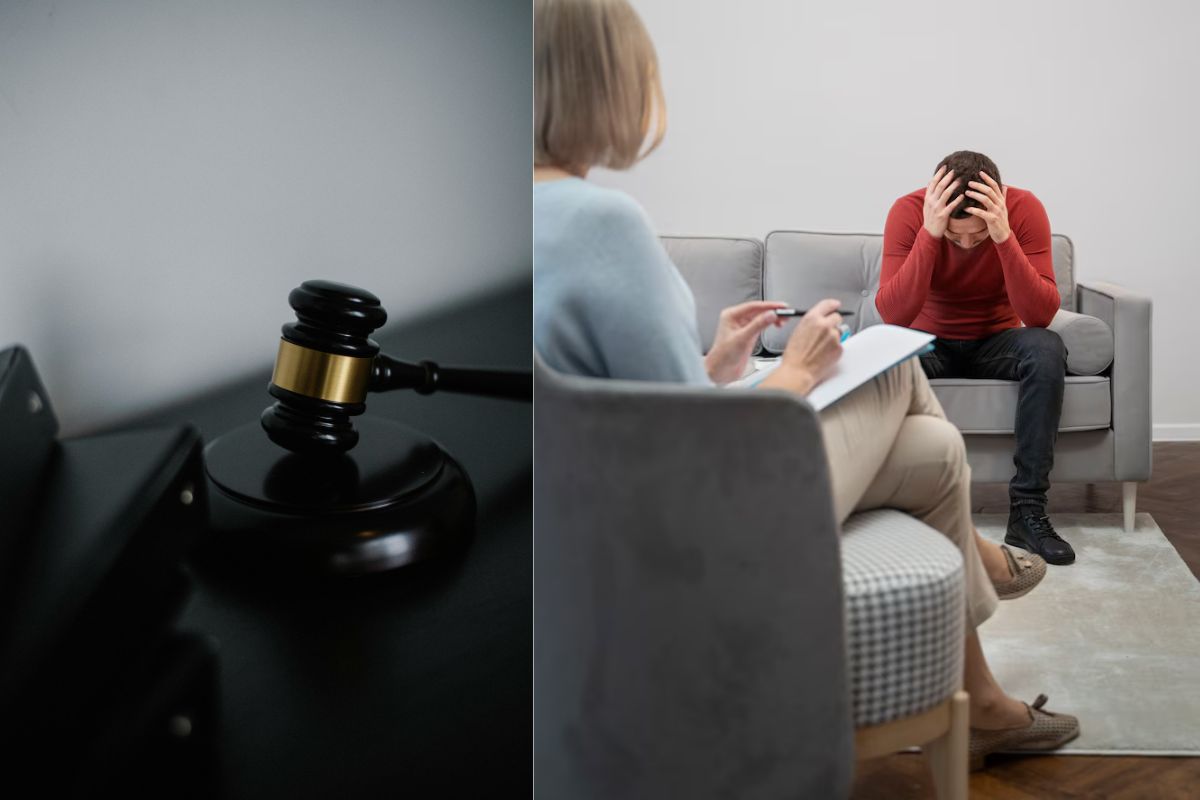What Happens If You Do Not Go To Court-Ordered Therapy?
Court-ordered therapy is required when someone’s behavior puts themselves or others at serious mental or physical risk. In these cases, a judge may step in and legally mandate the individual to attend therapy as part of a structured recovery plan. This legal process is meant to protect both the individual and the public.
Ignoring this order can lead to serious consequences. Since it is legally binding, missing court ordered therapy may result in penalties. These can include warnings, fines, extended probation, or even time in jail depending on the situation.
Court ordered therapy offers more than just a legal requirement—it provides a path to healing. These therapy sessions are led by trained professionals who help individuals cope with underlying issues. Skipping them not only breaks the law but also denies the opportunity for emotional and mental progress.
Failing to attend can also complicate your legal situation. You may have to appear in additional hearings, explain your absence, or face stricter rules. It’s important to attend every session or communicate quickly if problems arise.
Following through shows the court that you’re serious about improving. When you actively participate in therapy sessions, it often results in more favorable legal outcomes. Most importantly, it helps you take control of your future.
Taking court ordered therapy seriously can be the first step toward real, lasting change. It’s not just about meeting legal requirements—it’s about getting the help you need to move forward.

What Is Court-Ordered Therapy?
Court-ordered therapy is a mandatory treatment program assigned by a judge as part of a legal case. It usually applies when a person’s mental health, behavior, or addiction has caused harm or risk to themselves or others.
This type of therapy isn’t optional. A judge requires the individual to attend counseling or psychological treatment with a licensed therapist. The goal is to help the person address emotional or behavioral issues that may have led to their legal trouble.
Court-ordered therapy can be part of criminal cases, custody battles, or probation terms. Common situations include drug or alcohol offenses, domestic violence, anger management problems, or mental health crises. In family court, it may also be used to support better parenting or resolve conflicts.
Therapy sessions may focus on topics like managing emotions, improving relationships, overcoming addiction, or developing coping skills. The court may also ask for progress reports from the therapist to ensure the person is attending and participating.
Failing to attend court-ordered therapy can lead to serious consequences. These may include fines, additional court appearances, or even jail time, depending on the case.
In short, court-ordered therapy is a legal tool to guide people toward personal growth and safer choices. It’s a structured way to get support, make changes, and avoid further legal issues.
How Is Court-Ordered Therapy Not the Same as Regular Therapy?
The biggest difference between court-ordered and regular therapy is confidentiality. In court-ordered therapy, privacy has limits.
Therapists are often required to report what happens in sessions to the court. If someone admits to breaking court rules—like drinking while ordered to stay sober—the therapist must inform the court.
Therapists must also report if a person skips sessions or refuses to cooperate. These reports can lead to serious consequences, including jail time.
In voluntary therapy, what’s shared stays private, unless there’s a threat of harm. But in court-ordered therapy, therapists serve both the patient and the legal system. This dual role makes it less private but still focused on support and recovery.
Understanding this difference helps people know what to expect and take the process seriously.

Why Courts Might Order Someone Into Therapy
Court-ordered therapy happens when legal and mental health systems work together to encourage lasting change. Instead of sending someone to jail, judges may require counseling to deal with deeper problems like addiction, trauma, or mental illness. This approach holds people accountable while also helping them recover.
A Safer Option Than Jail Time
In many cases, therapy is seen as a better choice than jail. Judges may send people to court ordered therapy when they commit minor offenses. This often happens when the person has a mental illness or addiction that influenced their actions. The main goal is to treat the root cause, not just punish the behavior.
Court-Monitored Outpatient Treatment
Some states, including Florida, allow outpatient therapy sessions for people with repeated hospital stays or legal trouble. Courts choose this option when someone can’t function safely in public without help. To qualify, the person must show a history of hospitalization or incarceration and be unlikely to seek help on their own.
Therapy During Family Legal Disputes
During divorces or custody battles, judges may ask one or both parents to attend therapy sessions. This usually happens when a parent’s behavior may affect the child’s wellbeing. In some cases, therapy is required to help a parent regain custody after issues like addiction or neglect.
When child protective services get involved, therapy often becomes part of the recovery plan. Parents might have to show they are sober and stable before bringing their children home. Court ordered therapy helps rebuild trust and create safer family environments.
Required Treatment for Sex Offenders
In some states, individuals convicted of sexual assaults must complete mandatory therapy programs as part of their sentence. These aim to prevent reoffending. Courts monitor attendance closely, and missing sessions can lead to more legal trouble.
Do You Have to Follow Court-Ordered Therapy?
Yes, court-ordered therapy is mandatory if a judge includes it in your legal sentence. Once it becomes part of a court ruling, you must attend every scheduled session and complete the requirements. Ignoring this order isn’t just a suggestion—it can lead to real legal consequences.
Judges issue court-ordered therapy when they believe it’s necessary for your rehabilitation or safety. Refusing to comply may send the message that you’re unwilling to take responsibility or improve your situation. Courts take that seriously.
Although a therapist can’t physically force you to remain in a session, the court can enforce attendance through legal action. Choosing not to participate or dropping out early may trigger additional penalties such as:
- Fines or financial penalties
- Extended probation periods
- Mandatory court hearings
- Possible jail time in severe cases
If you feel the therapy isn’t fair or you disagree with the order, you shouldn’t just stop attending. Instead, take control of the situation:
- Talk to your lawyer immediately: They can help you challenge or modify the court’s decision.
- Gather documentation: If you have medical reasons or past therapy history, share that with your attorney.
- Follow legal channels: Courts may allow appeals or modifications, but only through proper legal steps.
Following through with court-ordered therapy doesn’t just meet legal expectations. It gives you a chance to improve your mental health, address harmful patterns, and show the court that you’re committed to change. When you complete therapy as ordered, you’re actively taking steps toward a better outcome—for your case and your life.

What Happens If You Skip Court-Ordered Therapy?
Courts issue court ordered therapy when someone’s mental health or substance use puts themselves or others at serious risk. Judges don’t make these decisions lightly—they intervene to prevent harm and encourage personal recovery through structured treatment. If you’re facing this order, take it seriously from day one.
Skipping court ordered therapy is not just missing an appointment—it’s breaking the law. The court expects full participation, and ignoring this mandate brings swift consequences.
Here’s What Can Happen If You Don’t Attend
If you fail to show up for required sessions, the court will notice. These are some of the outcomes you could face:
- Legal Penalties: Judges may issue fines, extend your probation, or even send you to jail.
- Worsened Legal Standing: You risk losing credibility with the court, making your case harder to resolve favorably.
- Additional Court Appearances: Missed sessions often lead to follow-up hearings, which increase stress and prolong the legal process.
- Loss of Opportunities: Skipping therapy may cost you access to alternative sentencing programs or lighter penalties.
Why the Therapy Sessions Matter
These therapy sessions are more than just boxes to check off—they are a lifeline. Trained professionals use this time to help you understand your challenges and build healthier coping strategies. Showing up consistently allows you to:
- Learn how to manage stress, emotions, or addiction triggers
- Develop better communication and decision-making skills
- Rebuild relationships with loved ones or your community
- Gain tools that can help you avoid future legal trouble
How to Stay Compliant and Get the Most Out of It
To avoid setbacks, commit fully to the process. Here’s how to stay on track:
- Attend every session without fail. Treat them as non-negotiable appointments.
- Open communication early if you face transportation, scheduling, or health issues.
- Keep records of your attendance and progress—it shows accountability.
- Take the sessions seriously, even if the court mandated them. The benefits are real and long-lasting.
Your Effort Can Change the Outcome
When you follow through with court ordered therapy, you show the court you’re ready to take responsibility and improve your life. Judges often respond positively to genuine effort and commitment. More importantly, this process gives you the structure and support needed to create lasting change.
Avoiding sessions only makes the situation worse. But attending consistently can be a turning point—one that helps you meet legal requirements while also building a stronger, more stable future.
Conclusion
Court-ordered therapy is more than a legal requirement—it’s a chance to turn your life around. Skipping sessions leads to serious legal consequences and missed opportunities for personal growth. Attending each session shows the court that you’re willing to take responsibility, learn new skills, and make meaningful changes. These programs are designed to address root problems like trauma, addiction, and mental health challenges. By following through, you not only meet legal expectations but also gain tools to improve your well-being. Therapy can help you rebuild relationships, restore control over your life, and avoid future trouble. Committing to the process brings lasting benefits that go far beyond your court case. Take action now—your future depends on it.
FAQs
1. What is court-ordered therapy?
It’s a required form of treatment assigned by a judge. The goal is to address behavior linked to legal issues.
2. Can I refuse court-ordered therapy?
No, you must follow the court’s order. Refusal can result in fines, probation extensions, or even jail time.
3. What happens if I miss a session?
The court will be notified of missed sessions. You may face penalties, added hearings, or stricter legal consequences.
4. Is court-ordered therapy confidential?
It has limited confidentiality. Therapists may report your attendance, cooperation, and any violations to the court.
5. Does attending therapy help my legal case?
Yes, it shows responsibility and willingness to change. Courts often view consistent participation as a positive effort.

